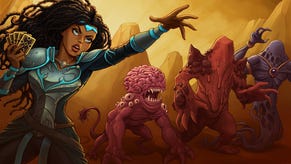Blitz Games Studios' Philip Oliver
The CEO talks Kinect, looking after employees and the ever-changing market
Absolutely. It's two-way because we too are communicating to them what's not working with the software and what extra functionality we want. In fact there have been some great new bits of software that we've requested and that Microsoft has been very receptive to and have developed and given us.
For example, and I know that's what you're going to ask next, 'what did they develop for you'! Let me tell you about Yoostar.
Yoostar is our next release, coming out in February. It's movie Karaoke, is the best way to describe it. What we found was, when controlling the interface you needed to stand back and do all the movements to control the cursor, so you had to be about five or six feet away from the screen. But for the actual filming, you need to have the Humphrey Bogart or the Arnold Schwarznegger close in scene, we don't want them five feet away from the camera. All of our clips are that way.
So what we wanted to do was, instead of asking the player to get closer to the camera, was zoom the camera into where they were. The Kinect camera is quite a high res camera, so we actually asked that we have access to the higher res picture. But they can't give the full resolution picture, at the full framerate, because of the USB 2.0 connection. It's just the technicalities of the Xbox.
So what we said was, we just need to access a section, a piece of the image and bring that through in a higher resolution. Effectively a digital zoom. Which they gave us. That's an excellent feature. So now you don't even have to get into frame yourself. The camera can select the right bit of the high res picture and zoom in itself.
It's more a revolution than an evolution. Evolution would suggest that you're just refining. They made a bold and radical move to go ' We're redefining the controller so much, there isn't one, it's you'. That's radical.
Quite frankly, when it was first conceived and first spoken about, a lot of people questioned it. I have to say, being fans of Minority Report and Total Recall and things like that, we thought - 'that sounds cool!' But me and Andy, we love tech, and this is real sci-fi stuff. It's revolution rather than evolution.
Evolution would suggest moving the buttons around, changing the shape. This is in a different ballpark.
I would say it's horses for courses. What is fundamental when you're producing a game is that you provide entertainment. For gamers, hardcore gamers, with their racers and shooters and that sort of thing, buttons and direct control, is the way to go. Microsoft aren't ruling that out. They're not trying to replace the controller, that's still there.
What they were trying to do with Kinect is to broaden the experiences and to go out there and create different genres, and not genres which are twitch-based. Take, for example, YooStar. It's not about, can you push the buttons quickly enough or accurately enough - it's a completely different experience. As is Dance Central, as is The Biggest Loser and all these.
They're trying to broaden genres and create games which are entertainment, not twitch-based controls and challenges. I also think that, over time, software on both sides, both the technology side and the engine side - that Microsoft's doing and middleware companies will provide, as well as the games - accuracy will improve where required.
The Kinect software, as it comes out of the box currently, had problems with doing floor-based exercises - detecting if you were doing sit ups or push ups and stuff - we developed our own libraries to detect all that. I think that you're going to see, over time, software solutions to improve accuracy. Over time it will get better anyway.
Dramatically, I think it's a genius idea. I know that all hardware manufacturers say that developing a new console, launching a new console, getting it in to the market is such a massive investment that they need to make the lifecycle last as long as possible. Historically that lifecycle's been about five years.
When both the Xbox 360 and the PlayStation 3 were designed, I remember both companies saying that they wanted to extend the lifecycles up to eight years. Well I would say that Kinect is a genius move because I think it will do exactly that. I think it will extend it from five years to eight years.
I would say, because I think it to be true, that Kinect will be tremendously successful and it will show the future of what's required next, which hopefully will be a console which is using the same principles as Kinect. It has a controller, it also has a camera input. They're almost paving the way for what the next generation of consoles will be some years down the line.
We're doing Move games as well, don't let me discount or exclude those. YooStar is on Move as well as Kinect. I think Sony just haven't made such a bold - risky some would say - move. I think the Move is definitely a step in the right direction - again, broadening the market and making games more accessible and making them more entertaining - less challenge-based.
So I think Move is a good move, but I don't think it's as radical, and therefore I don't think it'll get as much press.








